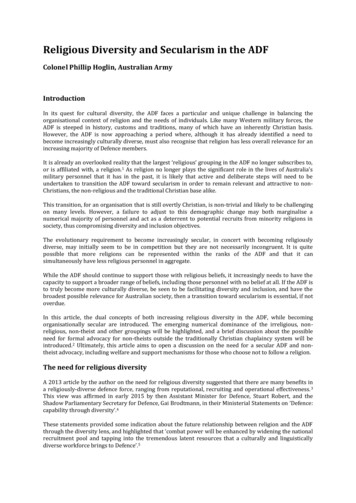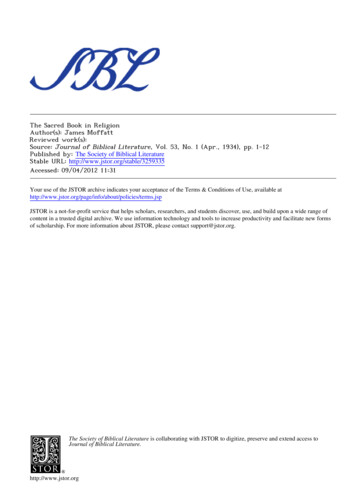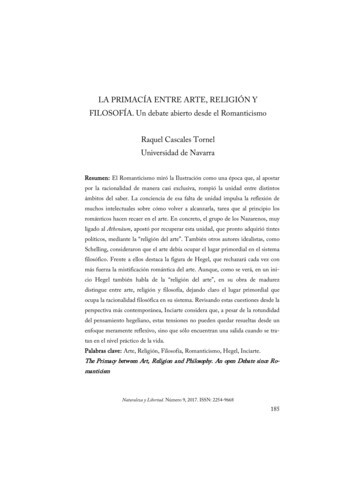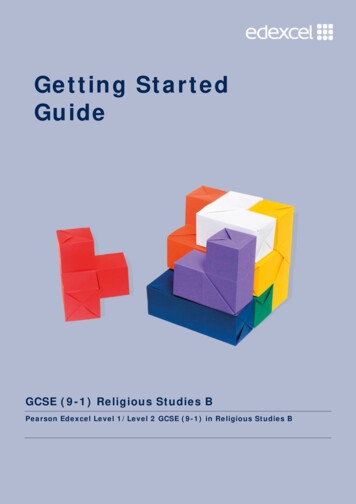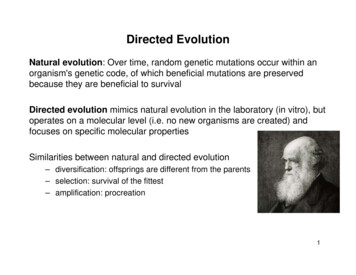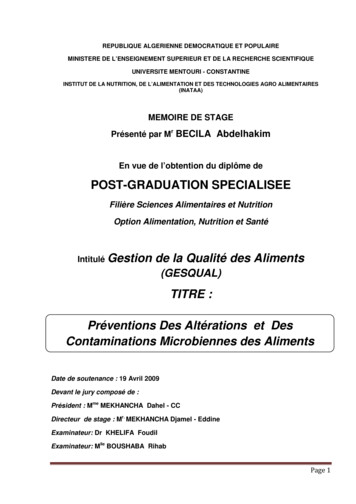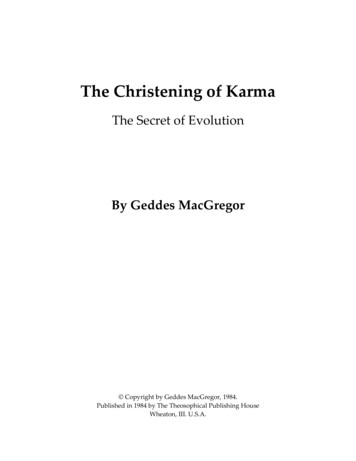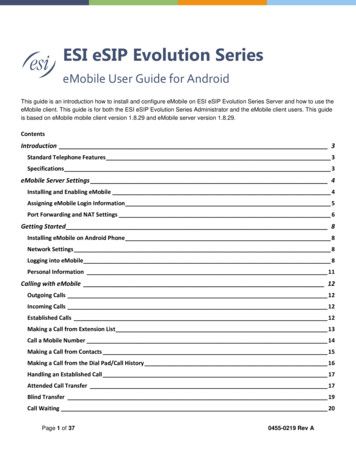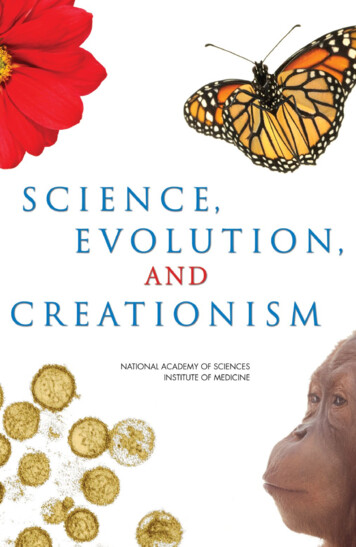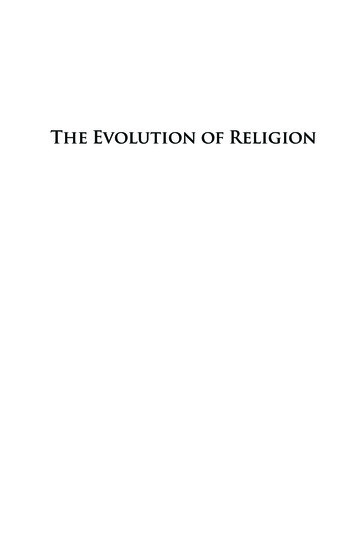
Transcription
The Evolution of Religion
The Evolution of Religionstudies,theories,& critiquesEdited ByJoseph Bulbulia, Richard Sosis, Erica Harris,Russell Genet, Cheryl Genet, and Karen WymanCollins Foundation Press
The Evolution of Religion: Studies, Theories, and CritiquesCopyright 2008 by Russell Merle Genet. All rights reserved.Published by the Collins Foundation Press4995 Santa Margarita Lake RoadSanta Margarita, CA 93453Except for brief passages quoted in a review or other work, no part of this bookmay be reproduced by any mechanical, photographic, or electronic process, normay it be stored in any information retrieval system or otherwise copied forpublic or private use, without the written permission of the managing editor.Technical Editors - Joseph Bulbulia and Richard SosisAcquisitions and Copy Editor - Erica HarrisManaging Editor - Russell GenetProduction Editor - Cheryl GenetPromotion Editor - Karen WymanSupporting copy edit coutesy of Vera WallenCover design by Cheryl GenetIncludes biographical referencesISBN 0-9788441-1-4Printed by Sheridan Books in the United States of AmericaEvolution of Religion website: www.evolutionofreligion.orgPublisher’s website: www.collinsfoundationpress.orgOther conferences in the series at: www.evolutionaryepic.org
CONTENTSList of Contributors9Note from the PublisherDwight Collins 11Preface: Bringing the Evolution of Religion into BeingRussell Genet and Cheryl Genet 13Introduction: Religion in EdenRichard Sosis and Joseph Bulbulia 15Part IEvolutionary Scenarios1Evolution and Religion: The Transformation of the ObviousDavid Sloan Wilson 232Cognitive Evolution and Religion; Cognition and Religious EvolutionHarvey Whitehouse 313From Apes to Devils and Angels:Comparing Scenarios on the Evolution of ReligionArmin W. Geertz 434Why People Believe (What Other People See As) Crazy IdeasWilliam Irons 51Part IIWhose Adaptation? Individuals, Groups, Cultural Variants5Religion Is Not an Adaptation:Some Fundamental Issues and ArgumentsLee A. Kirkpatrick 616Religious Attachment Theory and the Biosocial Evolution of theMajor World ReligionsStephen K. Sanderson 677Is Religion Adaptive?Yes, No, Neutral, but Mostly, We Don’t KnowPeter J. Richerson and Lesley Newson 738Is Religiousness a Biocultural Adaptation?Erica Harris and Patrick McNamara979Cultural Evolution of Intense Religiosity:The Case of “Sankirtan Fever” in the Hare Krishna MovementKimmo Ketola 87
10Supernatural Niche Construction Incubates Brilliance andGoverns the Ratchet EffectDavid Kydd 93Part III Tribes Under God11Pigeons, Foxholes, and the Book of Psalms:Evolved Superstitious Responses to Cope with Stress and UncertaintyRichard Sosis 10312Gods of War: The Adaptive Logic of Religious ConflictDominic Johnson 11113One Species under God?Sorting through the Pieces of Religion and CooperationAzim F. Shariff 11914Religion, Status, and Leadership in Neolithic Avebury: An Exampleof the Cauvin-Stark Religion Drives Innovation Hypothesis?Paul K. Wason 12715Evolution and Spiritual CapitalBarnaby Marsh 13316Humanism and the Future Evolution of ReligionCarl Coon 13917A Biocultural Evolutionary Exploration of Supernatural SanctioningChristopher Boehm 143Part IV Religion and Hard to Fake Signals18Free Love: Religious Solidarity on the CheapJoseph Bulbulia 15319Theological Expressions as Costly Signals of Religious CommitmentAndrew Mahoney 16120Commitment Costs and Cooperation:Evidence from Candomblé, an Afro-Brazilian ReligionMontserrat Soler 16721Ritual, Agency, and Sexual SelectionIlkka Pyysiäinen 17522The Attraction of Religion: A Sexual Selectionist AccountD. Jason Slone 18123Firewalking and the Brain: The Physiology of High-Arousal RitualsDimitris Xygalatas 18924He Who Laughs Best: Involuntary Religious Affectas a Solution to Recursive Cooperative DefectionJeffrey P. Schloss 197
Part V Gods in Minds25“Religious Experience” and the BrainAnn Taves 21126Are We All “Believers?”Jonathan A. Lanman 21927Memory Systems and Religious RepresentationMichael Teitelbaum 22528The Cognitive and Evolutionary Roots of Paradise RepresentationsJani Närhi 23129Spiritual Beings: A Darwinian, Cognitive AccountStewart Guthrie 239Part VI Gods in Bodies30Not Myself Today: A Cognitive Accountof the Transmission of Spirit Possession ConceptsEmma Cohen 24931Dualism, Moral Judgment, and Perceptions of IntentionalityGretchen Koch 25732iPods, Gods, and the Adolescent BrainCandace S. Alcorta 26333Once More, With Feelings:The Importance of Emotion for Cognitive Science of ReligionNicholas J. S. Gibson 27134Narrativity, Emotions, and the Origins of ReligionTom Sjöblom 27935Memes, Genes, and Dead Machines:Evolutionary Anthropology of Death and BurialWilliam W. McCorkle, Jr. 287Part VII Methodology36Keeping ‘Science’ in Cognitive Science of Religion:Needs of the FieldJustin L. Barrett 29537Evolutionary Psychology, Neuroscience and the Study of ReligionUffe Schjødt 30338Furthering the Evolution of Discussion of Religion:Multi-Method Study, Universality, and Cultural VariationAdam B. Cohen, Peter C. Hill, Azim F. Shariff,and Paul Rozin 311
39Selection, Traditions, Kinship, and Ancestor Worship:Crucial Concepts in the Evolution of ReligionLyle B. Steadman and Craig T. Palmer 31940Reflections on the Evolutionary Study of Religion:The Importance of Individual DifferencesBrian H. McCorkle 32741On Psychology and Evolution of Religion:Five Types of Contribution Needed from PsychologistsNicholas J. S. Gibson and Justin L. Barrett 33342Does Talk about the Evolution of Religion Make Sense?Donald Wiebe 339Part VIIIPhilosophical and Theological Themes43Can Religion Really Evolve? (And What Is It Anyway?)Luther H. Martin 34944How Sartre Inadvertently Presageda Proper Evolutionary Science of ReligionJesse M. Bering 35745Four Arguments That the Cognitive Psychology of ReligionUndermines the Justification of Religious BeliefMichael Murray 36546Does Evolution Threaten the Soul?Gretchen Koch 37147Essentialism and EvolutionBenson Saler 37948Religion: Accident or Design?Taner Edis 38749Theological Implications of the Cognitive Science of ReligionJustin L. Barrett 39350Thank God for Evolution!Michael Dowd 401
ContributorsAlcorta, Candace S. - Department of Anthropology,University of ConnecticutBarrett, Justin L. - Centre for Anthropology and Mind, School ofAnthropology and Museum Ethnography, University of OxfordBering, Jesse M. - Institute of Cognition and Culture,Queen’s University, BelfastBoehm, Christopher - Jane Goodall Research Center and Departments ofAnthropology and Biological Sciences, University of Southern CaliforniaBulbulia, Joseph - Religious Studies, Victoria University of WellingtonCohen, Adam B. - Department of Psychology, Arizona State UniversityCohen, Emma - Centre for Anthropology and Mind, School ofAnthropology and Museum Ethnography, University of OxfordCollins, Dwight - Collins Family Foundation; Presidio School of ManagementCoon, Carl - American Humanist Association; United NationsAmbassador (retired)Dowd, Michael - America’s Evolutionary EvangelistEdis, Taner - Division of Science - Physics, Truman State UniversityGeertz, Armin W. - Department of the Study of Religion,Faculty of Theology, University of AarhusGenet, Cheryl L. - Orion Institute; Cuesta CollegeGenet, Russell M. - Orion Observatory; California State PolytechnicUniversity; Cuesta CollegeGibson, Nicholas J. S. - Psychology and Religion Research Group,Faculty of Divinity, University of CambridgeGuthrie, Stewart - Department of Anthropology, Fordham UniversityHarris, Erica - Department of Neurology, Boston University School ofMedicine and Boston VA Healthcare System, Jamaica Plain CampusHill, Peter C. - Rosemead School of PsychologyIrons, William - Department of Anthropology, Northwestern UniversityJohnson, Dominic - Department of Politics, University of EdinburghKetola, Kimmo - The Church Research Institute, Tampere, FinlandKirkpatrick, Lee A.- Department of Psychology, College of William and MaryKoch, Gretchen - Department of the Study of Religion,University of AarhusKydd, David - Institute of Cognitive and Evolutionary Anthropology,University of OxfordLanman, Jonathan A. - Centre for Anthropology and Mind, Institute ofCognitive and Evolutionary Anthropology, University of OxfordMahoney, Andrew - Religious Studies, Victoria University of WellingtonMarsh, Barnaby - Department of Zoology, University of OxfordMartin, Luther H. - Department of Religion, University of Vermont;Institute of Cognition and Culture, Queen’s University, Belfast
10McCorkle, Brian H. - Center for the Study of Religion and Psychology,The Albert and Jesse Danielsen Institute at Boston UniversityMcCorkle, William W., Jr. - Institute of Cognition and Culture, Queen’sUniversity, BelfastMcNamara, Patrick - Department of Neurology, Boston University Schoolof Medicine and Boston VA Healthcare System, Jamaica Plain CampusMurray, Michael - New College, University of OxfordNärhi, Jani - Department of Comparative Religion, University of HelsinkiNewson, Lesley - School of Psychology, University of ExeterPalmer, Craig T. - Department of Anthropology, University ofMissouri-ColumbiaPyysiäinen, Ilkka - Department of Comparative Religion, HelsinkiCollegium for Advanced Studies, University of HelsinkiRicherson, Peter J. - Department of Environmental Science and Policy,University of California-DavisRozin, Paul - Department of Psychology, University of PennsylvaniaSaler, Benson - Anthropology Department, Brandeis UniversitySanderson, Stephen K. - Institute for Research on World-Systems,University of California-RiversideSchjødt, Uffe - Department of the Study of Religion, University of AarhusSchloss, Jeffrey P. - Biology Department, Westmont CollegeShariff, Azim F. - Department of Psychology, University of British ColumbiaSjöblom, Thomas - Department of Comparative Religion,University of HelsinkiSlone, D. Jason - Religious Studies, Webster UniversitySoler, Montserrat - Department of Anthropology, Rutgers UniversitySosis, Richard - Department of Anthropology, University of Connecticut;Department of Sociology and Anthropology, HebrewUniversity of JerusalemSteadman, Lyle B. - Department of Anthropology, Arizona State UniversityTaves, Ann - Department of Religious Studies, University of CaliforniaSanta BarbaraTeitelbaum, Michael - Religious Studies, Victoria University of WellingtonWason, Paul K. - Science and Religion Programs, John Templeton FoundationWiebe, Donald - Trinity College, University of TorontoWhitehouse, Harvey - School of Anthropology and MuseumEthnography, University of OxfordWilson, David Sloan - Departments of Biology and Anthropology,Binghamton UniversityWyman, Karen - North American Science and Religion Foundation;Claremont Graduate UniversityXygalatas, Dimitris - Institute of Cognition and Culture,Queen’s University, Belfast
Note from the PublisherThis volume is a guidebook of sorts, providing an introduction to the scienceof the evolution of religion. It documents a scholarly dialog that occurred ata resort nestled into the volcanic foothills of Oahu during a week long conference in early 2007. While its basic form is a compilation of the proceedings from that conference, the general effect is greater than what that formwould typically imply. The scope of the subject matter is expansive and theresult is a highly inclusive survey, culling from a range of research results andmethods, propositions, apologies, rebuttals, and critiques. A broad range ofquestions necessary to the maturation of this field were posed, together forthe first time it seems.My interest in this subject and this dialog as publisher is at first glanceoblique to my organization’s expressed goals. The mission of the CollinsFamily Foundation (www.collinsff.org) and its publishing segment, theCollins Foundation Press (www.collinfoundationpross) is to provide leadership in humanity’s efforts to live sustainably. This is executed in a numberof ways, including the support of Russ and Cheryl Genet, the co-chairs ofthis conference. Russ is an accomplished polymath and a dear friend of longstanding. His formidable scientific mind is exceeded only by his skill at identifying prescient and underdeveloped lines of inquiry and rallying expertstogether, making space for progress and innovation. With his backgroundas an accomplished astronomer and student of evolution, he provides mewith important perspectives on the topic of sustainability. Cheryl, a scholarof science and spirituality, connects the disparate pieces of conference implementation, thereby melding the fruits of Russ’ skills into a viable vessel forthe meeting of the experts’ minds.The connection between the contents of this book and the goal of promoting sustainability is direct. Over the last century it has become increasingly apparent that as a species, sustaining the fruits of our global civilizationon this resilient but finite planet is challenging our capacity for cooperation inways that humanity has never faced. Specifically the likelihood of impending dramatic changes in climate presents such a challenge. We are enteringa bottleneck shaped by the collision of our material success and the planet’s
12finite resources, where the opportunity for reversing current climate trendsis steadily diminishing. Over the course of human history, religious institutions have been a major vehicle for managing large scale cooperation. In ourpredisposition to be religious, I see a potential that needs to be studied andunderstood in sympathetic ways on a much broader scale. Navigating ourway through this bottleneck, to a condition of sustainable human endeavoron our planet, requires a wisdom and understanding that we as a civilizationcurrently lack.In particular, how could our scientific understanding of the role of religion in human behavior help us become sustainable? Consider the exampleof the tribal social instincts hypothesis proposed by Peter Richerson andRobert Boyd in Not by Genes Alone, How Culture Transformed HumanEvolution. Pete and Rob point out that these within-tribe instincts thatevolved through the dynamic of gene/culture co-evolution predispose us to(1) exhibit guarded altruism to non-relatives, (2) show limited tolerance forleadership, (3) conform to social institutions, (4) sufficiently trust to permitdivision of labor, and (5) enforce rules of fairness. Simultaneously, other ancient instincts predispose us to make war inter-tribally when the survival ofour own tribe is threatened. In what ways can our ancient warring instinctsyield to our within-tribe social instincts to help us cooperate more globally?In this context, what would it take for populations of the world to perceivethemselves as the one tribe that they truly are relative to the finite naturalresources of this unique planet?It is an honor for me to have been a part of the January 2007 International Conference on the Evolution of Religion, and to sponsor the publication of this book, The Evolution of Religion: Studies, Theories, & Critiques. Iapplaud its more than 50 authors for their initiative in coming together andfor their scholarship in producing this comprehensive record.Dwight Collins,President,Collins Family FoundationNovember, 2007
PrefaceBringing the Evolution of Religion into BeingThe International Conference on the Evolution of Religion and these proceedings were conceived in February 2006, when Dwight Collins, our close friendof three decades, visited us here in Hawaii. It was only natural, when considering our futures, that our discussion turned to conferences, for we hadworked together organizing several in the past.Some eleven years earlier, in February of 1995, Dwight joined us for aconference held at the Lazy-K-Bar Guest Ranch in Arizona. Russ, on retiring from the directorship of the Fairborn Observatory on Mt. Hopkins, Arizona, was able to pursue his lifelong interest in cosmic evolution—science’sintegrated “story” of physical, biological, and cultural evolution. What betterway to learn than to organize (with Brian Swimme and Loyal Rue) a conference on The Epic of Evolution?In 1996, Dwight flew half way around the world to New Zealand toattend The Evolution of Humanity, a conference Russ organized with MichaelCorballis (Auckland University), held on the beach at Awaroa in Able Tasman National Park. Subsequently, with Dwight, we organized a ProfitableSustainability retreat, held in 2003 at the Hacienda, William RandolphHearst’s picturesque Spanish ranch house inland from his more famouscastle on the California coast. In 2004, we organized a conference with worldhistorian David Christian entitled Cosmic Evolution and Big History, alsoheld at the Hacienda. Dwight and our good friend Peter Richerson (University of California, Davis) attended. Finally, we were pleased to help ConnieBarlow and Michael Dowd organize the “evolutionary salon,” EvolutionaryDirectionality, held at The Hacienda in 2005.As we considered possibilities for future conferences with Dwight, theevolution of religion arose as a natural topic. Russ has a keen interest in cultural evolution, and religion is a key, even central facet, of all human cultures.Cheryl’s focus is science and human meaning, and Dwight has an interestin the religious dimensions of sustainability. As the President of the CollinsFamily Foundation, Dwight kindly agreed, on the spot, to fund the publication of the conference proceedings. His foundation’s generosity launchedthis conferences.On returning to the mainland, we immediately contacted Peter Richerson. Who were the experts on the scientific study of the evolution of religion? Pete suggested we contact Richard Sosis (University of Connecticut
14and Hebrew University). Rich sent us his review paper on the topic and putus in touch with Joseph Bulbulia (Victoria University, Wellington) who alsofurnished his own review paper. We contacted the authors in these reviewpapers, inviting them to the Hawaii conference on the Evolution of Religion.Developing and bringing the conference and proceedings to completionrequired the work of many individuals. Joseph Bubulia, Richard Sosis, andArmin Geertz (University of Aarhus, Denmark) served as the programorganizing committee. It was this team that organized the sessions and setup and directed panels and workshops. In addition, Joseph and Rich lenttheir expertise to the technical editing and final organization of the conference papers. We were also joined, early-on, by two graduate students, KarenWyman (Claremont Graduate School) and Erica Harris (Boston University) who handled logistics and implementation. Erica served as the initialcopy and format editor for these proceedings. Vera Wallen provided the finalcopy edit of the entire fifty papers and the front matter. Dan Wyman builtand maintained the conference website with exceptional skill and dedication.Michael Dowd supported speakers in the technical and time-limit aspects oftheir presentations to help the conference run smoothly and on schedule.The heart of the conference was the speakers themselves. Each brought aunique perspective to the scientific study of religion, to the evolution of religionin the larger evolutionary trajectory, and to the ultimate meaning of religion.They prepared their presentations, traveled (in some cases halfway aroundthe world), shared ideas, and met deadlines for their proceedings papers.The John Templeton Foundation provided honoraria for graduatestudents and other financial support, and Paul Wason and Barnaby Marsh,Templeton Foundation scientists, spoke at the conference. The Collins Family Foundation and the Orion Observatory sponsored the daily morningrefreshments, and the International Association for the Study of Scienceand Religion funded the poolside welcome reception that launched the conference. The Orion Institute and the North American Science and ReligionFoundation provided logistical support.As should be evident from this volume, the conference was a dramatic success. Another conference, The Evolutionary Epic, will be held at theMakaha Resort on January 3-8, 2008. It will be a reprise, over a decade later,of the earlier Epic of Evolution. In that time, science’s story has been refined,and is now more widely understood by the public at large. We will, in thisupcoming conference, consider both the Epic and how it is faring in its telling and incorporation into education, religion, and humanity’s sustainablepresence on planet Earth (www.EvolutionaryEpic.org).Russell M. Genet and Cheryl L. GenetConference Co-chairs
IntroductionReligion in EdenRichard Sosis and Joseph BulbuliaIn early January 2007, scholars from around the world gathered in MakahaValley, Hawaii to attend the first International Conference on the Evolution ofReligion. Scientific research on the origin and evolution of religion has maderapid advances in the past two decades. The conference assessed how far thebiological and social sciences have come toward explaining religiosity and religious culture, and looked for ways of improving and integrating distinctivenaturalistic approaches. The conference also provided venues for those withphilosophical and theological interests to raise questions about the relevanceof this new research to questions internal to religious faith and practice.Scholars came from Canada, Israel, Mexico, New Zealand, United States,and throughout Europe. They represented an array of religious backgrounds(Islam, Christianity, Judaism, and Buddhism) and beliefs (secularists, humanists, atheists, agnostics, theists, and even a self-proclaimed “creatheist”).More importantly, the spectrum of disciplines represented was extraordinarily wide, including cognitive psychologists and anthropologists, evolutionarypsychologists, behavioral ecologists, anthropologists, evolutionary biologists,religious studies scholars, philosophers of science, historians, physicists,astrophysicists, neuroscientists, ecologists, archaeologists, and theologians.One of the most successful aspects of the conference was that it broughttogether three scholarly groups who have otherwise had little sustainedcontact: religious studies scholars, cognitive scientists of religion, and evolutionary scientists interested in studying religion. While there have beenfruitful collaborations between religious scholars and cognitive scientists,and evolutionary and cognitive scientists have also lately begun a productivedialogue, scholars from all three areas rarely find themselves under the sameroof. This is unfortunate for many reasons. While evolutionary scientistshave garnered considerable media attention from their recent forays into thestudy of religion, this work has often been pursued independently of, andoften uninformed by, current religious scholarship. At this January 2007 For recent reviews of anthropological research on the evolution of religion, see Dow(2006) and Sosis & Alcorta (2003); and for reviews of evolutionary cognitive studies of religion,see Atran (2006); Barrett (2000); Bering (2006); Boyer (2003); and Bulbulia (2004, 2007).
1616Introduction Richard Sosis and Joseph Bulbuliaconference, evolutionary scholars were pleasantly surprised at the depth ofempirical research that already exists within the field of religious studies, andencouraged by the openness of some religious scholars to evolutionary ideas,but were somewhat dismayed by the recurrent misunderstandings of howselectionist theories are applied to human behavior. For their part, manyreligious studies scholars were skeptical about the potential of evolutionaryapproaches in explaining diverse religious patterns and trends. Most werecurious about the possibilities of integrating evolutionary perspectives intotheir work, but many were cautious, and others were openly antagonistic. Aswould be expected in an emerging field such as the evolutionary study of religion, calls for more empirical and theory driven research were heard almostdaily. Also heard were claims that religious scholarship has already producedan abundance of descriptive materials ready for evolutionary analyses andavailable to test rival theories. However that debate is decided, all wouldagree that the number of exciting studies and promising theories presentedeach day of the conference was impressive.A fourth group of participants contributed to our understanding of theimplications of evolutionary research to practical, political, and spiritual life.These individuals were interested in the future of religion, including its impact on sustainable development, the role that evolutionary science can playin the spiritual transformations of contemporary religions, and the dynamicrelationship between humanism and religion. For those of us with our headsburied in research, it was refreshing to see how those outside the academyare interpreting, grappling with, and employing our findings.As all participants will attest, the conference was physically and intellectually exhausting. There were more than 50 talks over five and half days,and no sessions were run in parallel. Sessions and workshops ran all morningand afternoon, and the daytime activities were capped off every evening witha distinguished plenary address.Harvey Whitehouse (Oxford University) opened the conference onJanuary 3, with a detailed overview of cognitive and evolutionary studies ofreligion. He carefully laid out the major issues confronting evolutionary studies of religion, summarizing the leading hypotheses, assessing the currentstate of understanding, and presenting critical methodological and empiricalquestions future research must address. The next morning we began the firstfull day of the conference. By lunchtime we had considered several scenariosfor the evolution of religion and initiated discussions about whether religionis adaptive. That evening, noted historian and religious studies scholar, Luther Martin (University of Vermont and ICC, Queens University Belfast),delivered an impassioned and illuminating attack on evolutionary analysesof religion. He thoroughly outlined the concerns that evolutionary scientists
Religion in Eden1717must deal with and resolve if evolutionary studies of religion are to successfully impact traditional historical scholarship. His talk stimulated equallyimpassioned discussion and debate.The second full day of the conference focused on the adaptive benefitsof supernatural beliefs, commitments, and practices. We also consideredthe application of signaling and sexual selection theories for understandingthe evolution of religion. In the evening, Anne Taves (UC Santa Barbara)directed our attention to under-examined questions about cognition and thebody, the construction of the self through narratives, and the role of “religiousexperience” in religious life. Taves urged that the “sui generis” model of thiscategory impairs scientific progress. In its place, Taves motivated an “attributive model of religious experience.” Successful re-introduction of “religiousexperience” to naturalistic approaches appears to provide one of the morepromising horizons for scientific exploration.The third full day of the conference focused on cognitive research in theevolutionary study of religion, including new experimental and observationalstudies. Renowned philosopher Daniel Dennett (Tufts University) was theevening speaker. Dennett reinforced an important theme of the conference,namely that the intergenerational flow of information is not restricted to lineages of genes. He also presented an account for the taming of wild religion,urging that substantive transformations in the nature of religious information occurred during the major transition from foraging to agrarian and urban lifeways. Dennett’s talk generated a spirited discussion on many fronts,about the utility of memetics for understanding the evolution of religion, therelationship between evolutionary research on religion and the lay public, aswell the relationship between evolutionary researchers and their (religious)study populations.On the penultimate day of the conference, we focused on the transmission of religious concepts and the narratives through which religion is understood. We also looked at the function of supernatural concepts and practicesthrough the study of religious brains. That evening, North America’s ‘evolutionary evangelist’, the Rev. Michael Dowd, shared his experience of teachingand preaching a sacred, meaningful view of cosmic, biological, and humanevolution. He offered a possible solution to the dead-end debates betweentheists and atheists, and argued that evolutionary theory may be essential fora deeply inspired life. It was a rare meeting between academic and religiousworlds, for both audience and speaker. Despite having delivered hundreds oftalks to secular and religious audiences across the theological spectrum, thiswas Dowd’s first presentation to an academic audience.We closed the conference by addressing foundational questions aboutthe naturalistic study of religion, as well as questions about the economic,
18Introduction Richard Sosis and Joseph Bulbuliaspiritual, and political benefits and costs of religious belief and practice.Biologist and religious scholar, Jeffrey Schloss (Westmont College), closedthe conference by detailing the various threads of argumentation linkingnaturalistic (generally functionalist) inquiry about religion to wider theological questions. Schloss also used the example of laughter—which he skillfully induced frequently in his audience—to illustrate an important themeof the conference: the role of commitment signals in authenticating genuinereligious commitments. The talk stimulated much discussion over the relationship of religious commitment to science and morality, the reliability ofreligious signaling, and the role of religious feeling in its evolutionary history.In addition to the research sessions and evening talks, there were threescheduled afternoon workshops aimed at assessing
36 Keeping 'Science' in Cognitive Science of Religion: Needs of the Field Justin L. Barrett 295 37 Evolutionary Psychology, Neuroscience and the Study of Religion Uffe Schjødt 303 38 Furthering the Evolution of Discussion of Religion: Multi-Method Study, Universality, and Cultural Variation Adam B. Cohen, Peter C. Hill, Azim F. Shariff,
